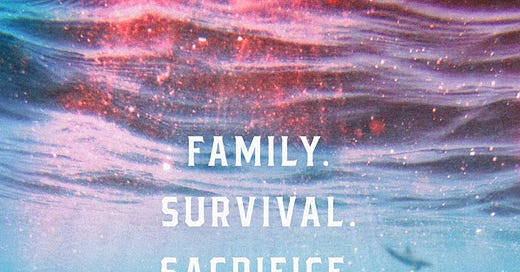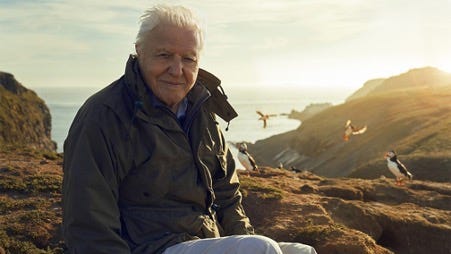Who gets to speak? Who gets to use their voice for what they believe in, regardless of what's considered polite, or grateful? Because don't let's frighten the horses - the audience, the readers, the children - with the truth.
NO. LET'S TELL IT.
WILD ISLES
And let's have every episode broadcast as it was intended to be. We need the truth and we need to trust the person telling it to us.
Fiction can go in where facts can't, and as no one forces a writer to sit there making things up, or to read what they've written, the gloves are off. All you have to do is tell a good enough story, and care passionately about what you're writing about. The first part of that sentence is much harder - so it was extremely uplfiting for me when my science-backed cetacean epic and third novel, POD, was longlisted for the 2023 Women's Prize for Fiction.
It's a story of tribal conflict and coming of age - set in a very real ocean. The novel treats whales and dolphins as citizens, as people, and their ecosystem (part of the Indian Ocean) as just as important as our own. This is an adult book because the protagonists face adult perils of every kind - but only the warning song of the lone humpback whale reports the truth - as far as he knows it. And in this story just as in our own terrestrial human world, there are those that would rather not hear it.
I'm proud that Amitav Ghosh, author, environmentalist and public intellectual, said that it 'succeeds splendidly in rising to the most important literary challenge of our time - restoring voice and agency to other-than-human beings'. I never set out to do that, only to tell the imagined experience of creatures I had briefly seen, in an ocean I fear for - and to tell a gripping story. In his The Great Derangement and also The Nutmeg's Curse, Amitav Ghosh opened my eyes to the weave of human activity on the natural world, and I highly recommend both.
Also in the last month, I compered an inspiring online event presented by Writers Rebel, featuring so many ocean heroes, known and unknown. From Hugo Tagholm of Oceana to Captain Paul Watson and many more, this is really worth a watch. Watch below and whizz through to who you want to hear first.
Taking animals seriously is the slippery slope we stand on - that we must, like a nervous skier, overcome our fear and commit to travelling. That journey leads to our own survival.
I also highly recommend the theatrical cri de coeur that is the adaptation of the brilliant novel Drive Your Plow Over The Bones of the Dead by Olga Tokarczuk, a very dark and urgent fable about a 60 year old woman who links the deaths of blood-thirsty patriarchal hunters, to the wild animals they consider fair game. This is rousing and inspiring stuff, and theatre for people who think think they don't like theatre. Adapted for the stage by the also ever-brilliant Theatre de Complicité
We need stories, we need science as stories (How to Speak Whale by Tom Mustill), stories with science - like POD, and intimate personal stories that fuse humans and animals into a compassionate ecosystem.
I haven't yet got to Doreen Cunningham's Soundings, a memoir of her travels as a single mother with her small son to find grey whales, but it sounds wonderful.
In a troubled world, we take solace where we can. The writer Geoff Dyer once said to me, 'Lal, never start gardening: nothing ages you faster.' Here's my new gardening book giving me comfort and joy, Sustainable Garden by Marian Boswall.
See you next month!
Laline








